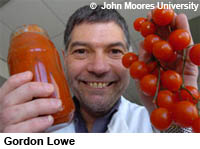Lycocard to investigate why pizza and ketchup are good for our hearts
The tomato is the most widely eaten vegetable in Europe, although strictly speaking it is not a vegetable at all. The tomato's red pigment, lycopene, is well known as a stubborn stain, not easily removed from clothing or plastic containers. While lycopene is a devil to clean, it is an angel for your heart, implicated in, amongst other things, the improvement of cardiovascular heath. Lycopene is found in several red and orange fruits and vegetables, such as watermelon, rosehip, papaya and tomato. It is in the tomato that lycopene is found in the greatest concentrations, and while the cooking and processing of vegetables reduces the vitamin content, those same processes increase the lycopene content. So, the processed tomatoes found in pizza toppings, tomato sauces and even in ketchup have high quantities of lycopene. While lycopene had been implicated in the treatment of osteoporosis, cancer (especially prostate cancer), diabetes, and even male infertility, it is in the treatment of cardiovascular diseases that the new Lycocard (Lycopene and Cardiovascular health) project is most interested. Dr Volker Böhm of the Institute of Nutrition at the Friedrich Schiller University in Jena, Germany, coordinates the project. 'The European food industry could strengthen its position since the demand for healthy tomato products will rise, and the development of such is one of the sub-goals of this project,' he said. Partners in the project include scientists, technologists, industrial partners and patient organisations, each investigating a specific area of the tomato. Lycocard is a Specific Targeted Research Project (STREP), funded under the EU's Sixth Framework Programme (FP6), and will run for five years. Dr Gordon Lowe works at the Nutraceutical Research project, John Moores University in Liverpool, UK, a partner in Lycocard. The unit has previously placed foods such as garlic (to examine cardioprotection), green tea (immunostimulation), ginger, echinacea, and carotenoids (cardioprotection) under the microscope to see how their properties may be beneficial, and is a world leader in such research. 'Some partners, especially in Spain and Italy, are looking at processing and how to make lycopene more available,' Dr Lowe told CORDIS News. 'We will examine uptake and the mechanisms for uptake, isomers of lycopene, methods of transport in the body and the effects on atherosclerosis [hardening of the arteries].' Dr Lowe's work will also focus on the effect of lycopene on cholesterol. 'Cholesterol is vital to a healthy body but a high level in the blood is a major risk factor for coronary heart disease. Cholesterol is transported around the human blood by special carriers called lipoproteins. There are several kinds of these, but low-density lipoprotein (LDL) and high-density lipoprotein (HDL) are the most important. 'If you have too much LDL cholesterol in your blood, it can slowly build up in the walls of the arteries feeding your heart and brain. Together with other substances it can form a thick, hard deposit that can clog these arteries and this condition is known as atherosclerosis. We believe that lycopene could play a vital role in preventing atherosclerosis by stopping the lipoproteins from becoming oxidised. The oxidation of low-density lipoproteins can lead to 'fatty steaks' being deposited in the arteries,' he said. While eating five portions of fruit and vegetables per day is considered essential for a healthy life, both Drs Lowe and Böhm agree that at least one of those servings should be of processed tomato. The Liverpool team will also investigate how smoking can alter the way the body absorbs lycopene. The Lycocard project links 16 individual partners across Germany, the UK, France, Hungary, Italy and Spain. The project is to receive 5.2 million euro to examine the effects of lycopene, and how the substance is influenced by the various processes that take it from farm to fork. While we know that lycopene concentrations are increased during processing and cooking, we have only a vague understanding of how. Lycocard will shed some light on these processes, and hopefully provide something everyone wants - a reason to eat something both delicious and good for you.
Countries
Germany, Spain, France, Hungary, Italy, United Kingdom

